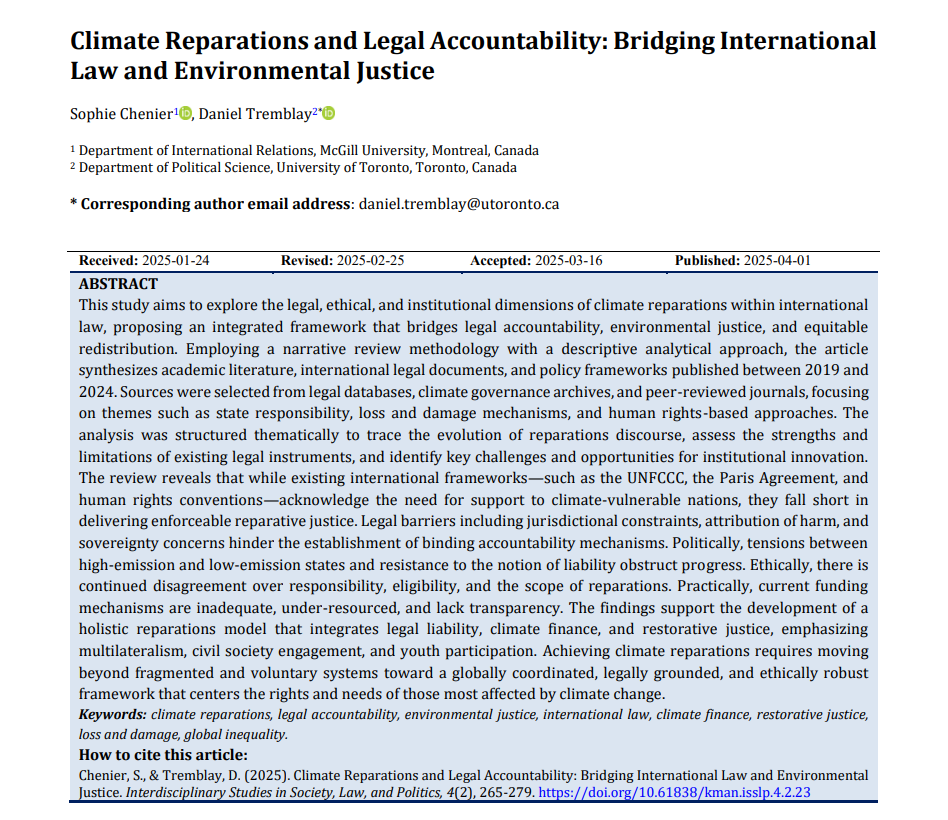Climate Reparations and Legal Accountability: Bridging International Law and Environmental Justice
Keywords:
climate reparations, legal accountability, environmental justice, international law, climate finance, restorative justice, loss and damage, global inequalityAbstract
This study aims to explore the legal, ethical, and institutional dimensions of climate reparations within international law, proposing an integrated framework that bridges legal accountability, environmental justice, and equitable redistribution. Employing a narrative review methodology with a descriptive analytical approach, the article synthesizes academic literature, international legal documents, and policy frameworks published between 2019 and 2024. Sources were selected from legal databases, climate governance archives, and peer-reviewed journals, focusing on themes such as state responsibility, loss and damage mechanisms, and human rights-based approaches. The analysis was structured thematically to trace the evolution of reparations discourse, assess the strengths and limitations of existing legal instruments, and identify key challenges and opportunities for institutional innovation. The review reveals that while existing international frameworks—such as the UNFCCC, the Paris Agreement, and human rights conventions—acknowledge the need for support to climate-vulnerable nations, they fall short in delivering enforceable reparative justice. Legal barriers including jurisdictional constraints, attribution of harm, and sovereignty concerns hinder the establishment of binding accountability mechanisms. Politically, tensions between high-emission and low-emission states and resistance to the notion of liability obstruct progress. Ethically, there is continued disagreement over responsibility, eligibility, and the scope of reparations. Practically, current funding mechanisms are inadequate, under-resourced, and lack transparency. The findings support the development of a holistic reparations model that integrates legal liability, climate finance, and restorative justice, emphasizing multilateralism, civil society engagement, and youth participation. Achieving climate reparations requires moving beyond fragmented and voluntary systems toward a globally coordinated, legally grounded, and ethically robust framework that centers the rights and needs of those most affected by climate change.
Downloads
References
Ashrafuzzaman, M., Gomes, C., & Guerra, J. (2022). Climate Justice for the Southwestern Coastal Region of Bangladesh. Frontiers in Climate, 4. https://doi.org/10.3389/fclim.2022.881709
Caballero, R., & Merlis, T. M. (2024). Polar Feedbacks in Radiative-Advective Equilibrium From an Air Mass Transformation Perspective. https://doi.org/10.31223/x5f69x
Chen, H., Wang, H., & Ping, L. (2021). Research on Logistics Carbon Emission Mathematical Estimation and Compensation by Computer Statistics and Data Analysis. Journal of Physics Conference Series, 2083(3), 032069. https://doi.org/10.1088/1742-6596/2083/3/032069
Gaikwad, N., Genovese, F., & Tingley, D. (2022). Creating Climate Coalitions: Mass Preferences for Compensating Vulnerability in the World’s Two Largest Democracies. American Political Science Review, 116(4), 1165-1183. https://doi.org/10.1017/s0003055422000223
Hazeleger, W., Liu, Y., & Attema, J. (2020). Evidence for Atmosphere-Ocean Meridional Energy Transport Compensation in the Past Decades. https://doi.org/10.5194/egusphere-egu2020-4104
Liu, Y., Attema, J., & Hazeleger, W. (2020). Atmosphere–Ocean Interactions and Their Footprint on Heat Transport Variability in the Northern Hemisphere. Journal of Climate, 33(9), 3691-3710. https://doi.org/10.1175/jcli-d-19-0570.1
Morón, S., Blum, M., Salles, T., Frederick, B. C., Farrington, R., Ding, X., Mallard, C., Mather, B., & Moresi, L. (2021). Isostasy Amplifies Relative Sea-Level Change on Continental-Scale Deltas. https://doi.org/10.5194/egusphere-egu21-13678
Nikitina, E., & Пожилова, Н. А. (2023). International Mechanisms to Compensate for Climate Loss and Damage: Innovations. World Economy and International Relations, 67(10), 62-70. https://doi.org/10.20542/0131-2227-2023-67-10-62-70
Nyka, M. (2021). State Responsibility for Climate Change Damages. Review of European and Comparative Law, 45(2), 131-152. https://doi.org/10.31743/recl.12246
Shafi, K. M., Khan, A., & Islam, R. (2021). Climate Change Action and State Sovereignty. Margalla Papers, 25(2), 98-108. https://doi.org/10.54690/margallapapers.25.2.77
Stabile, M. C. C., Garcia, A., Salomão, C. S. C., Bush, G., Guimarães, A. L., & Moutinho, P. (2022). Slowing Deforestation in the Brazilian Amazon: Avoiding Legal Deforestation by Compensating Farmers and Ranchers. Frontiers in Forests and Global Change, 4. https://doi.org/10.3389/ffgc.2021.635638
Watts, K., Vansweevelt, T., & Weyts, B. (2023). Climate Change, Compensation and Unpredictable or Uninsurable Loss: A Possible Path Forward Using Compensation Funds. Journal of European Tort Law, 14(3), 316-351. https://doi.org/10.1515/jetl-2023-0017

Downloads
Additional Files
Published
Submitted
Revised
Accepted
Issue
Section
License

This work is licensed under a Creative Commons Attribution-NonCommercial 4.0 International License.





